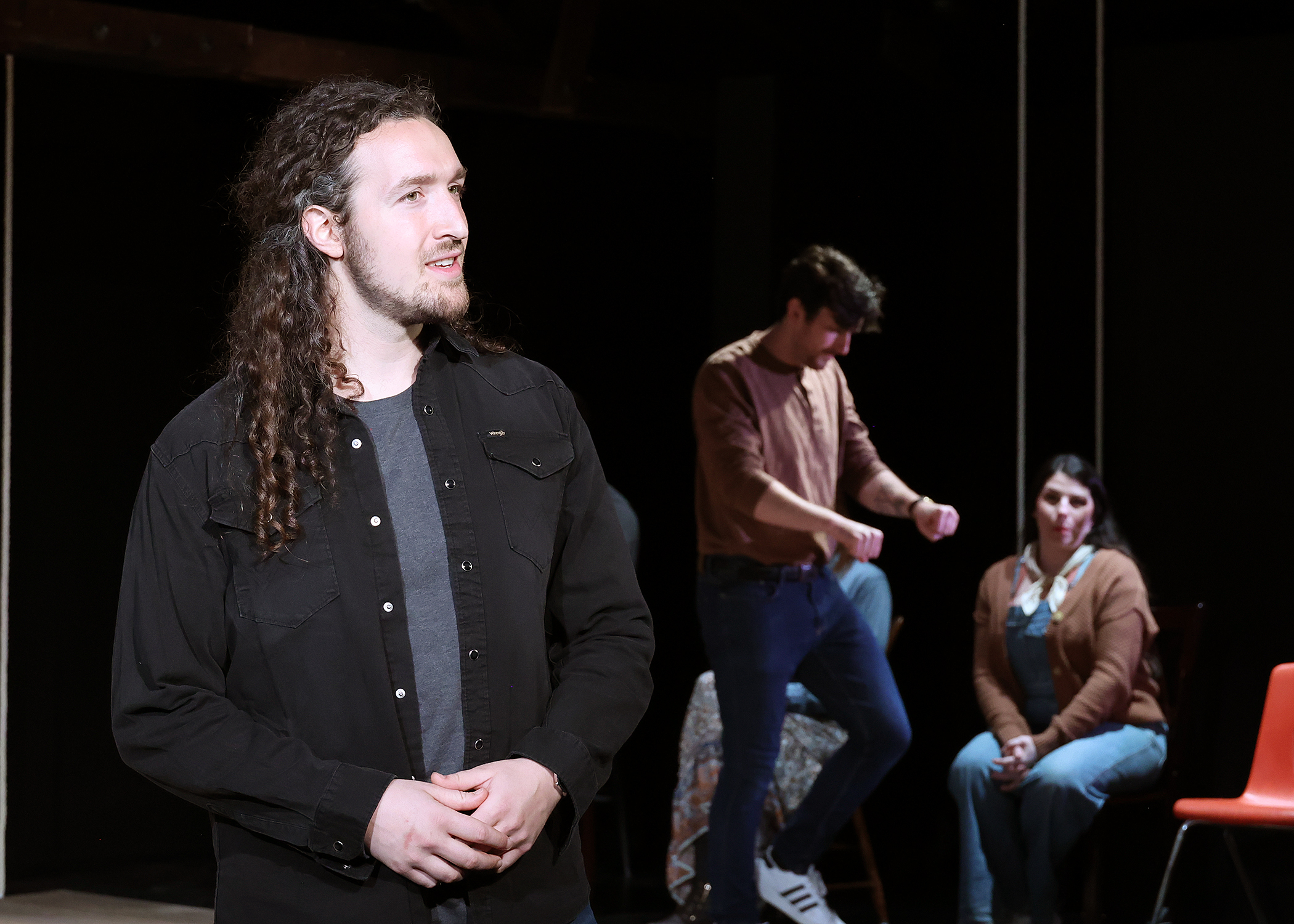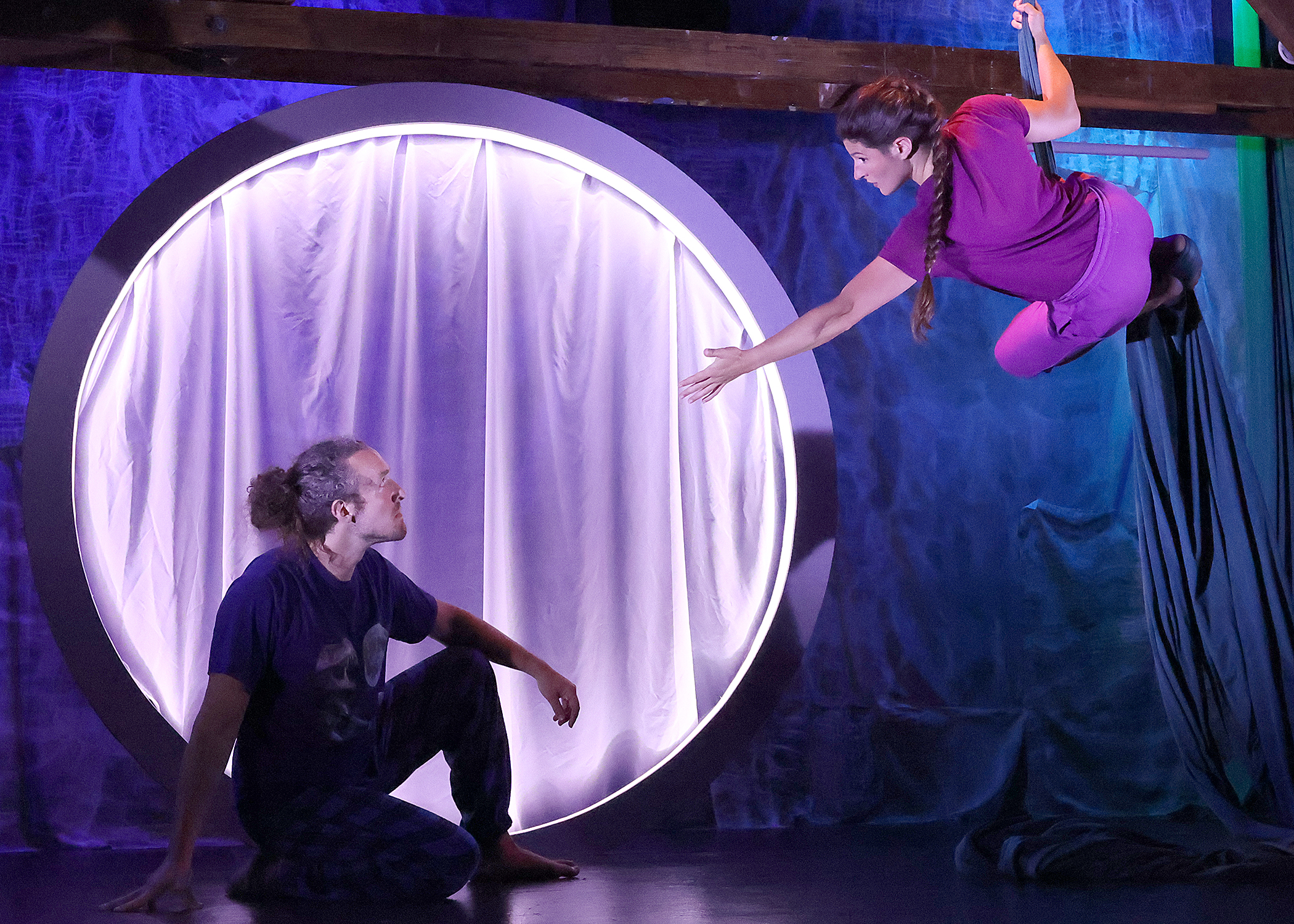
Our Town at Cape Rep is Strange… and Wonderful

You’ve probably seen Our Town before, if only as a—yikes— high-school production. Forget all that. Director Maura Hanlon’s version, which just opened at Cape Rep Theatre, is nothing like you’ve ever seen. And it’s absolutely fantastic.
Our Town is a play that needs a thoughtful production to draw out its interesting parts. Wilder plays don’t “just work” the way—for example—a Pinter play does, because of its meticulous crafting, so every Pinter production is near-identical, while something like Our Town leaves a lot more room for a production to have a unique take on the text… and Hanlon absolutely fills that room.
Because it’s considered part of the classic American canon, a lot of people don’t realize how profoundly strange it is, and how much is going on behind (and beyond) the sometimes-saccharine storyline. Hanlon’s put a lot of that strangeness into the forefront, and has done some fresh things with expressionistic movement, all of which make this the best production I’ve seen of this play.
Our Town usually generates a certain folksy old-timey warmth, but even that is blunted, as costume designer Robin McLaughlin places the characters in ordinary, casual, slightly drab twenty-first century costumes, resulting in a sense that they simply plucked their clothes out of their closets or even—especially in the case of George—off their floors. Nothing to see here, just as there’s a “nothing to see here” feel to Ryan McGettigan’s scenic design, which follows Wilder’s own requirement for limited furniture; McGettigan gives us a plethora of chairs, few of which match, and two high stools. The audience is left to fill in the blanks.

And the energy is high. For a supposedly sleepy town, this place is inhabited by people who are constantly on the go. Nick Nudler as Stage Manager sets the scene in more ways than one with his whirling-dervish physicality; he inhabits this role so intensely that it’s hard to imagine anyone else pulling it off; the audience is so engaged that when he addresses them—managing to make pretty consistent eye contact—he even elicits spontaneous verbal responses.
The various inhabitants of the town meanwhile are going about their business, prosaic as Real Life tends to be. Without props, everyone manages to make clear what they’re doing, and it feels at first that one is looking from a bird’s-eye level at a miniature train-set’s versions of village life, where everyone is moving about in their own little circle of activity: setting tables, cooking, bringing the milk, even delivering babies. Grover’s Corners has the requisite number of people (including the Poles and Canucks across the railroad tracks, where the Catholic church is also isolated) in the requisite number of roles for a recognizable WASP community.
But the thread running through behind the words—and emphasized in particular by Nudler’s delivery—is of a world in flux despite the seemingly sold mass of Grover’s Corners. Wilder was writing after a pandemic and a world war (the one that was supposed to end all wars), during a time when fascism was on the rise, when issues of immigration and racism were bubbling, when technology was accelerating and spelling the end of many occupations. And the third act should take no-one by surprise: Nudler’s Stage Manager started talking about death from the very beginning.
The acting was consistently and absolutely superb. Everyone’s acting. Nudler may have had the lion’s share of onstage presence, but other cast members, most of them playing multiple roles without changing costume, made a myriad of characters come vividly alive for the audience.

Two families constitute the backbone of the cast: Dr. Gibbs (Lewis D. Wheeler), Mrs. Gibbs (Denise Page), and their son George (Cam Torres), are friends and neighbors with Mr. Webb (Brian Lore Evans), Mrs. Webb (Amanda Collins), and their daughter Emily (Katherine Paulsen when I saw the production; beginning May 8th the role will be played by Kirsten Peacock). Inevitably and endearingly, George and Emily fall in love, manage a proposal at a soda fountain, and are married in Act Two.
Other characters fill in the necessary town roles: the constable (Wheeler), the milkman (played by Jess Andra in a charming gender reversal), a local doddering professor (Jared Hagan), the church organist and choir director (Hagan, again), the paperboy (Evans), the undertaker (Evans), the briefly returning relative (Collins, in another gender reversal), the town gossip (Andra), even the milkman’s horse, inevitably called Bessie (Torres). The actors’ fluidity in moving so clearly and definitively from one character to another in an instant was outstanding. A review detailing everyone’s performance would be massive, filled with superlatives, and well-earned.
The richness of the production manifests in details small and large. It’s evident in the music—several times the church choir sings, and the harmonies are both delicate and solid; Hagan’s solo during the funeral will blow you out of your seat. And characters’ struggles to connect their inner lives with their outer lives, expressed mostly in homespun philosophical resignation, become vivid. One of the threads running through is Mrs. Gibbs’ desire to see Paris; though she tells her husband of her desire, and indeed reminds him of it over time (by humming Frère Jacques and serving French toast) she realizes only after death that she had the money for the vacation—and never took it.
The staging for the third act is startling, and I won’t give it away, nor the abrupt change in costume for certain characters, nor even Paul Miller’s excellent lighting choices. It’s disconcerting and wonderful.
Many productions have emphasized the surface message, cliché as it may be: enjoy the small things in life for, as Emily says, “oh, earth, you’re too wonderful for anybody to realize you.” But the third act shows Wilder interested in emphasizing those small things because they are in fact not such a great loss at death—everyone is disappointed when life is over. Only saints and poets, says the Stage Manager, really get it.
But with this production, the audience just might, too.

More Recent Provincetown News




 Accommodations
Accommodations  Art
Art  Bars
Bars  Books
Books  Entertainment
Entertainment  Events
Events  Featured
Featured  Guides
Guides  History
History  Literary stuff
Literary stuff  Most Popular
Most Popular  Provincetown News
Provincetown News  Restaurants
Restaurants  Reviews
Reviews  Shopping
Shopping  Theatre
Theatre  Uncategorized
Uncategorized  Weed
Weed